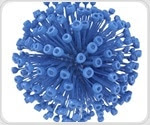| |
 Research published Wednesday in Genome Medicine details a novel and promising approach in the effort to treat Alzheimer's disease. Research published Wednesday in Genome Medicine details a novel and promising approach in the effort to treat Alzheimer's disease. | |
|
| |
 DNA sequencing could soon become part of the routine diagnostic workup for patients with chronic kidney disease, suggests a new study from Columbia University Medical Center. DNA sequencing could soon become part of the routine diagnostic workup for patients with chronic kidney disease, suggests a new study from Columbia University Medical Center. | |
|
| |
 Genetic susceptibility to bipolar disorder can increase the risk for suicide attempt, but only among those who also have experienced traumatic stress, reports a study published in the December 2017 issue of the Journal of the American Academy of Child and Adolescent Psychiatry. Genetic susceptibility to bipolar disorder can increase the risk for suicide attempt, but only among those who also have experienced traumatic stress, reports a study published in the December 2017 issue of the Journal of the American Academy of Child and Adolescent Psychiatry. | |
|
| |
 Researchers at Johns Hopkins Bloomberg School of Public Health have discovered a genetic mutation in the FluMist intranasal flu vaccine that has the potential to be altered to enhance the vaccine's protective effect. Researchers at Johns Hopkins Bloomberg School of Public Health have discovered a genetic mutation in the FluMist intranasal flu vaccine that has the potential to be altered to enhance the vaccine's protective effect. | |
|
| |
 Some individuals' skin appears more youthful than their chronologic age. Although many people try to achieve this with creams, lotions, injections, and surgeries, new research published in the Journal of the American Academy of Dermatology indicates that increased expression of certain genes may be the key to intrinsically younger looking - and younger behaving - skin. Some individuals' skin appears more youthful than their chronologic age. Although many people try to achieve this with creams, lotions, injections, and surgeries, new research published in the Journal of the American Academy of Dermatology indicates that increased expression of certain genes may be the key to intrinsically younger looking - and younger behaving - skin. | |
|
| |
 Most complex diseases, such as obesity, longevity, and diabetes, are largely influenced by genetic factors. But at the same time, they are also modulated by environmental stimuli, such as diet and physical activity. Most complex diseases, such as obesity, longevity, and diabetes, are largely influenced by genetic factors. But at the same time, they are also modulated by environmental stimuli, such as diet and physical activity. | |
|
| |
 In the science-fiction movie Gattaca, visitors only clear security if a blood test and readout of their genetic profile matches the sample on file. Now, cheap DNA sequencers and custom software could make real-time DNA-authentication a reality. In the science-fiction movie Gattaca, visitors only clear security if a blood test and readout of their genetic profile matches the sample on file. Now, cheap DNA sequencers and custom software could make real-time DNA-authentication a reality. | |
|
| |
 Researchers from The Scripps Research Institute (TSRI) have designed a bacterium that incorporates two unnatural bases, called X and Y, into genes, in addition to the four natural DNA bases − G, C, A and T − that usually code for proteins. Researchers from The Scripps Research Institute (TSRI) have designed a bacterium that incorporates two unnatural bases, called X and Y, into genes, in addition to the four natural DNA bases − G, C, A and T − that usually code for proteins. | |
|
| |
 An epitranscriptome is a set of functionally appropriate RNA modifications. There are nearly one hundred known modifications of RNA; the most common modification in internal mRNA is N6-methyladenosine (m6A). Transfer RNAs (tRNAs), mRNAs, and ribosomal RNAs (rRNAs) are the three types of RNAs that are post-transcriptionally modified. An epitranscriptome is a set of functionally appropriate RNA modifications. There are nearly one hundred known modifications of RNA; the most common modification in internal mRNA is N6-methyladenosine (m6A). Transfer RNAs (tRNAs), mRNAs, and ribosomal RNAs (rRNAs) are the three types of RNAs that are post-transcriptionally modified. | |
|
| |
 Scientists at Joslin Diabetes Center have taken another step toward solving a long-standing puzzle about heart health in type 2 diabetes, with a finding that eventually may point towards more personalized patient care. Scientists at Joslin Diabetes Center have taken another step toward solving a long-standing puzzle about heart health in type 2 diabetes, with a finding that eventually may point towards more personalized patient care. | |
|
| |
 Researchers from the CTS-158 GALENO group at the University of Cadiz, directed by professor José Castro Piñero, have been working for three years on an important multicenter study based on an analysis of the influence of physical activity on the development of cardiovascular disease, a study in which they have taken into account environmental, nutritional, emotional and genetic factors, among others. Researchers from the CTS-158 GALENO group at the University of Cadiz, directed by professor José Castro Piñero, have been working for three years on an important multicenter study based on an analysis of the influence of physical activity on the development of cardiovascular disease, a study in which they have taken into account environmental, nutritional, emotional and genetic factors, among others. | |
|
| |
 The MDI Biological Laboratory has announced that Aric Rogers, Ph.D., has received a grant of $455,000 over two years from the National Institute on Aging, one of the institutes of the National Institutes of Health, for research on the cellular mechanisms governing longevity. The MDI Biological Laboratory has announced that Aric Rogers, Ph.D., has received a grant of $455,000 over two years from the National Institute on Aging, one of the institutes of the National Institutes of Health, for research on the cellular mechanisms governing longevity. | |
|
| |
 Glioblastoma, the most common and aggressive form of brain cancer, typically fails to respond to treatment or rapidly becomes drug resistant. Glioblastoma, the most common and aggressive form of brain cancer, typically fails to respond to treatment or rapidly becomes drug resistant. | |
|
| |
 Pancreatic cancer is one of the most aggressive forms of cancer and is currently very difficult to treat. However, the last few years have seen advances in the scientific understanding of how this cancer develops at a molecular level. Pancreatic cancer is one of the most aggressive forms of cancer and is currently very difficult to treat. However, the last few years have seen advances in the scientific understanding of how this cancer develops at a molecular level. | |
|
| |
 Mount Sinai researchers have identified six genes that activate hundreds of other genes in children experiencing severe allergic reactions to peanuts. Mount Sinai researchers have identified six genes that activate hundreds of other genes in children experiencing severe allergic reactions to peanuts. | |
|
| |
 Safety switches that automatically stop the device for example before it overheats are built into many electrical appliances. Cells are also equipped with such "emergency stop" functions. They make sure that a defective cell doesn't become a tumor cell. Safety switches that automatically stop the device for example before it overheats are built into many electrical appliances. Cells are also equipped with such "emergency stop" functions. They make sure that a defective cell doesn't become a tumor cell. | |
|
| |
 Researchers report creating a biologically accurate mass-production platform that overcomes major barriers to bioengineering human liver tissues suitable for therapeutic transplant into people. Researchers report creating a biologically accurate mass-production platform that overcomes major barriers to bioengineering human liver tissues suitable for therapeutic transplant into people. | |
|
| |
 There's a continued drive towards making in vitro assays ever more translational towards in vivo models and ultimately the clinic. This ties in with the resurgence of phenotypic screening and is a response to the perceived poor translation of the traditional simple cell-based assays, often developed to study just single protein targets. There's a continued drive towards making in vitro assays ever more translational towards in vivo models and ultimately the clinic. This ties in with the resurgence of phenotypic screening and is a response to the perceived poor translation of the traditional simple cell-based assays, often developed to study just single protein targets. | |
|
| |
 Sanger sequencing is a method of sequencing DNA developed by Frederick Sanger in 1977. In Sanger sequencing, chain-terminating dideoxynucleotides are incorporated into the growing DNA chain at random positions. The sequence is then inferred from the set of incrementally terminated DNA chains separated by polyacrylamide gel electrophoresis. Sanger sequencing is a method of sequencing DNA developed by Frederick Sanger in 1977. In Sanger sequencing, chain-terminating dideoxynucleotides are incorporated into the growing DNA chain at random positions. The sequence is then inferred from the set of incrementally terminated DNA chains separated by polyacrylamide gel electrophoresis. | |
|
| |
 Human sperm may hold the potential to serve as biomarkers of the future health of newborn infants, according to a new study by a Wayne State University School of Medicine research team. Human sperm may hold the potential to serve as biomarkers of the future health of newborn infants, according to a new study by a Wayne State University School of Medicine research team. | |
|
| |
 A new study assessed the effects of a SLC6A15 gene variant on resting-state brain function in patients with major depressive disorder (MDD), comparing the results with those in healthy individuals. A new study assessed the effects of a SLC6A15 gene variant on resting-state brain function in patients with major depressive disorder (MDD), comparing the results with those in healthy individuals. | |
|
| |
 A newly developed microscope is providing scientists with a greatly enhanced tool to study how neurological disorders such as epilepsy and Alzheimer's disease affect neuron communication. A newly developed microscope is providing scientists with a greatly enhanced tool to study how neurological disorders such as epilepsy and Alzheimer's disease affect neuron communication. | |







No hay comentarios:
Publicar un comentario